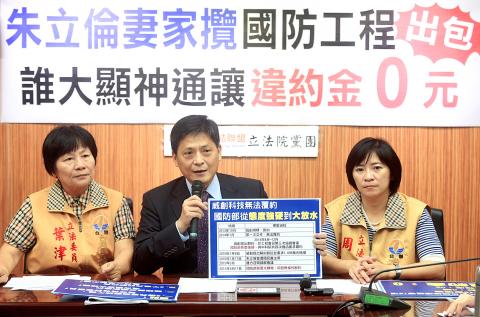Chinese Nationalist Party (KMT) Chairman and presidential candidate Eric Chu (朱立倫) might have pulled some strings to bring about an out-of-court settlement between the Ministry of National Defense and Vtron Technology, the Taiwan Solidarity Union (TSU) caucus said yesterday.
TSU caucus convener Lai Chen-chang (賴振昌) told a press conference that Vtron owner Kao Yu-jen (高育仁), Chu’s father-in-law, won a ministry contract in 2013 to manufacture key components for the Tien Chien II (TC-2), a medium-range air-to-air missile, by tendering a bid that was 35 percent below the minimum and failed to deliver.
Vtron’s successful bid generated doubts in the arms manufacturing industry from the outset and Vtron did not disappoint, drawing a complete blank in terms of development, Lai said, adding it was very suspicious that the ministry had a sudden change of heart and did not pursue legal action against Vtron.

Photo: Chien Jung-fong, Taipei Times
The project called for the production of 19 types of TC-2 missile components. With the minimum bid set at NT$238 million (US$7.28 million), Vtron won the bid by offering NT$150 million, with a promise to turn in the components 300 days after the signing of the contract.
The ministry and the Chung Shan Institute of Science and Technology have repeatedly demanded that Vtron produce the components, with the fourth such demand going out last year, Lai said.
The ministry had claimed it would not let Vtron off lightly because of its political connections, Lai said, referring to Kao and Chu.
However, the ministry did not press charges against Vtron, while the company took the ministry to court to effectively annul its contractual obligations, as well as ask for NT$1.92 million for material expenditures and NT$15 million for estimated benefits, the TSU said.
Lai said it was incredible that Vtron was able to win the project with its below-the-minimum bid and escape unscathed after failing to fulfill its contract.
The ministry’s abrupt U-turn in June, when it absolved Vtron of all responsibility, was highly suspicious and hints of behind-the-scenes political manipulation, Lai said.
Chu must offer an explanation for the turn of events, as Vtron might have robbed the government of NT$30 million in contract violation fees, he said.
Chu dismissed the allegations as nothing more than slander and rumormongering.
“It is inevitable that election mudslinging would eventually include me, but the public will only look down on [political parties] that employ smear tactics against my family,” Chu said.
Ministry spokesman Major General David Lo (羅紹和) said that the ministry strictly follows government regulations on procurement and subcontracting, and does not give special consideration to any company regardless of their background.
Additional reporting by CNA

Alain Robert, known as the "French Spider-Man," praised Alex Honnold as exceptionally well-prepared after the US climber completed a free solo ascent of Taipei 101 yesterday. Robert said Honnold's ascent of the 508m-tall skyscraper in just more than one-and-a-half hours without using safety ropes or equipment was a remarkable achievement. "This is my life," he said in an interview conducted in French, adding that he liked the feeling of being "on the edge of danger." The 63-year-old Frenchman climbed Taipei 101 using ropes in December 2004, taking about four hours to reach the top. On a one-to-10 scale of difficulty, Robert said Taipei 101

Nipah virus infection is to be officially listed as a category 5 notifiable infectious disease in Taiwan in March, while clinical treatment guidelines are being formulated, the Centers for Disease Control (CDC) said yesterday. With Nipah infections being reported in other countries and considering its relatively high fatality rate, the centers on Jan. 16 announced that it would be listed as a notifiable infectious disease to bolster the nation’s systematic early warning system and increase public awareness, the CDC said. Bangladesh reported four fatal cases last year in separate districts, with three linked to raw date palm sap consumption, CDC Epidemic Intelligence

Taiwanese and US defense groups are collaborating to introduce deployable, semi-autonomous manufacturing systems for drones and components in a boost to the nation’s supply chain resilience. Taiwan’s G-Tech Optroelectronics Corp subsidiary GTOC and the US’ Aerkomm Inc on Friday announced an agreement with fellow US-based Firestorm Lab to adopt the latter’s xCell, a technology featuring 3D printers fitted in 6.1m container units. The systems enable aerial platforms and parts to be produced in high volumes from dispersed nodes capable of rapid redeployment, to minimize the risk of enemy strikes and to meet field requirements, they said. Firestorm chief technology officer Ian Muceus said

MORE FALL: An investigation into one of Xi’s key cronies, part of a broader ‘anti-corruption’ drive, indicates that he might have a deep distrust in the military, an expert said China’s latest military purge underscores systemic risks in its shift from collective leadership to sole rule under Chinese President Xi Jinping (習近平), and could disrupt its chain of command and military capabilities, a national security official said yesterday. If decisionmaking within the Chinese Communist Party has become “irrational” under one-man rule, the Taiwan Strait and the regional situation must be approached with extreme caution, given unforeseen risks, they added. The anonymous official made the remarks as China’s Central Military Commission Vice Chairman Zhang Youxia (張又俠) and Joint Staff Department Chief of Staff Liu Zhenli (劉振立) were reportedly being investigated for suspected “serious